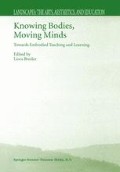Abstract
Embodied knowledge, the focus of this book, represents a sea change in perspectives on body and mind and their relationship to instruction and curriculum. As this volume demonstrates, philosophers and researchers have begun to sketch out these implications from theoretical and empirical perspectives. However, there is little available yet in the form of thick descriptions of school life that explore the relationship between theories of embodied knowledge and the enacted curricula.1
Access this chapter
Tax calculation will be finalised at checkout
Purchases are for personal use only
Preview
Unable to display preview. Download preview PDF.
References
Bresler, L. (1995, April). The arts in education project. Paper presented at the annual meeting of the American Educational Research Association, San Francisco, CA.
Bresler, L. (1998, December). The genre of school music and its shaping by meso, micro and macro contexts. Research Studies in Music Education, 11, 2–18.
Bresler, L. (1999, Winter). The hybridity and homogenization of school art. Visual Art Research, 25(2), 25–37.
Bresler, L., Wasser, J., & Hertzog, N. (1997). Casey at the bat: A hybrid genre of two worlds. Research in Drama Education, 2(1), 87–106.
Bresler, L., Wasser, J., Hertzog, N., & Lemons, M. (1996). Beyond the lone ranger researcher: Team work in qualitative research. European Journal for Research in Music Education, 7(4), 13–27.
Crossley, N. (1995). Body techniques, agency and intercorporeality: On Goffman’s relations in public. Sociology, 29(1), 133–149.
Cuban, L. (1998). How schools change reforms: Redefining reform success and failure. Teachers College Record, 99(3), 433–477.
Cuban, L. (1993). (2nd ed.). How teachers taught: Constancy and change in American classrooms, 1890–1990. New York: Teachers College Press.
Davidson, J. (2000). Living reading: Exploring the lives of reading teachers. New York: Peter Lang.
Davidson, J. (2002). The role of roles in school reform: The case of the educational technologist. Manuscript submitted for publication.
Davidson, J. (1995a, April). Art as experience and the anthropology of experience: Theoretical frameworks for understanding the experience of school art. Paper presented at the annual meeting of the American Educational Research Association, San Francisco, CA.
Davidson, J. (1995b, April). Refexivity and the collective sellf Paper presented at the annual meeting of the American Education Research Association, San Francisco, CA.
Davidson, J., & Olson, M. (2002, April). School leadership in networked schools: Deciphering the impact of large technical systems on education. Paper presented at the annual meeting of the American Educational Research Association, New Orleans, LA.
Davidson, J., & Walsh, D. (1994, March). The dilemma of inclusion: Multiple discourses in a complex early childhood program. Paper presentation at Sociolinguistics Symposium 10, Lancaster, England.
Dewey, J. (1980). Art as experience. New York: Perigree Books (Original work published in 1934).
Dewey, J. (1988). John Dewey: The later works, 1925–1953 (Volume I: 1925) (J. Boydston, P. Baysinger & B. Levine Eds.). Carbondale, IL: Southern Illinois University Press (Original work published in 1925).
Finders, M. (1997). Just girls: Hidden literacies and liife in junior high. New York: Teachers College Press.
Foucault, M. (1977). Discipline and punish: The birth of the prison (A. Sheridan, Trans.). New York: Vintage Books. (Original work published in 1975).
Giddens, A. (1984). The constitution of society. Berkeley and Los Angeles: University of California Press.
Goffman, E. (1959). The presentation of self in everyday life. New York: Doubleday Books.
Grumet, M. (1988). Bitter milk: Women and teaching. Amherst: University of Massachusetts Press.
Harraway, D. (1991). Simians, cyborgs, and women: The reinvention of nature. New York: Routledge Press.
Hertzog, N. (1995, April). Promise and Compromise: Arts in the elementary school curriculum. Paper presented at the annual meeting of the American Educational Research Association, San Francisco, CA.
Idhe, D. (1990). Technology and the liifee world: From garden to earth. Bloomington: Indiana University Press.
Lakoff, G., & Johnson, M. (1999). Philosophy in the flesh: The embodied mind and its challenge to western thought. New York: Basic Books.
Lemons, M. (1995, April). Organizing the experience of art for young people: Three case studies of music teaching. Paper presented at the annual meeting of the American Educational Research Association, San Francisco, CA.
McLaren, P. (1986). (2nd ed.). Schooling as a ritual performance: Towards a political economy of educational symbols and gestures. London: Routledge.
Merleau-Ponty, M. (1967). Phenomenology ofperception (C. Smith, Trans.). New York: The Humanities Press (First published in English in 1962).
Nespor, J. (1997). Tangled up in school: Politics, space, bodies, and signs in the educational process. Mahwah, NJ: Lawrence Erlbaum.
O’Farrell, C., Meadmore, D., McWilliam, E., & Symes, C. (Eds.) (2000). Taught bodies. New York: Peter Lang.
Piaget, J. (1977). The essential Piaget (H. Gruber & J. Voneche, Eds.). New York: Basic Books
Scheper-Hughes, N., & Lock, M. (1987). Mindful body: A prolegomenon to future work in medical anthropology. Medical Anthropology Quarterly, 1(1), 6–41.
Schilling, C. (1999). Towards an embodied understanding of the structure/agency relationship. British Journal of Sociology, 50(4), 543–562.
Vygotsky, L. S. (1978). Mind in society: The development of higher psychological processes (M. Cole, V. John-Steiner, S. Scribner & E. Souberman, Trans.). Cambridge, MA: Harvard University Press.
Wasser, J., & Bresler, L. (1996). Conceptualizing collaboration among teams of qualitative researchers. Educational Researcher, 26(4), 5–15.
Editor information
Editors and Affiliations
Rights and permissions
Copyright information
© 2004 Springer Science+Business Media Dordrecht
About this chapter
Cite this chapter
Davidson, J. (2004). Embodied Knowledge: Possibilities and Constraints in Arts Education and Curriculum. In: Bresler, L. (eds) Knowing Bodies, Moving Minds. Landscapes: the Arts, Aesthetics, and Education, vol 3. Springer, Dordrecht. https://doi.org/10.1007/978-1-4020-2023-0_13
Download citation
DOI: https://doi.org/10.1007/978-1-4020-2023-0_13
Publisher Name: Springer, Dordrecht
Print ISBN: 978-1-4020-2022-3
Online ISBN: 978-1-4020-2023-0
eBook Packages: Springer Book Archive

